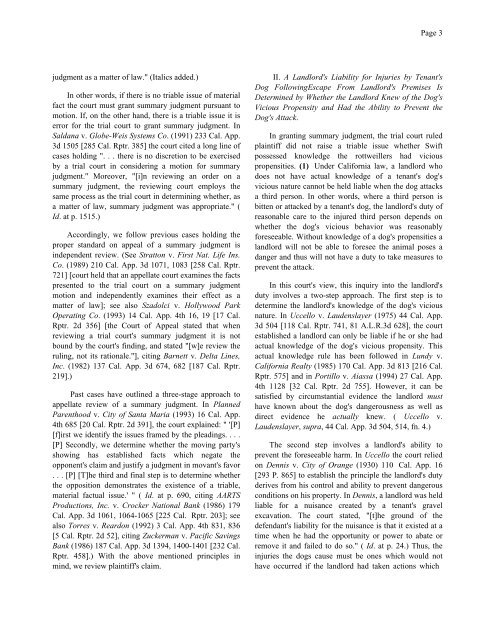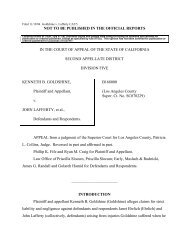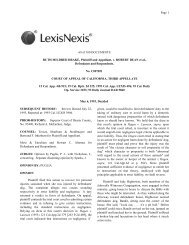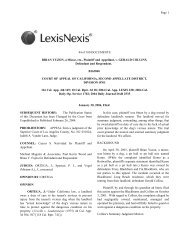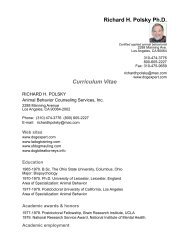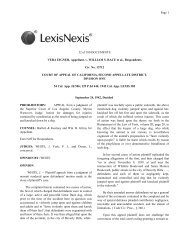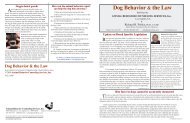Donchin v. Guerrero - Animal behavior dog bite expert witness
Donchin v. Guerrero - Animal behavior dog bite expert witness
Donchin v. Guerrero - Animal behavior dog bite expert witness
You also want an ePaper? Increase the reach of your titles
YUMPU automatically turns print PDFs into web optimized ePapers that Google loves.
Page 3<br />
judgment as a matter of law." (Italics added.)<br />
In other words, if there is no triable issue of material<br />
fact the court must grant summary judgment pursuant to<br />
motion. If, on the other hand, there is a triable issue it is<br />
error for the trial court to grant summary judgment. In<br />
Saldana v. Globe-Weis Systems Co. (1991) 233 Cal. App.<br />
3d 1505 [285 Cal. Rptr. 385] the court cited a long line of<br />
cases holding ". . . there is no discretion to be exercised<br />
by a trial court in considering a motion for summary<br />
judgment." Moreover, "[i]n reviewing an order on a<br />
summary judgment, the reviewing court employs the<br />
same process as the trial court in determining whether, as<br />
a matter of law, summary judgment was appropriate." (<br />
Id. at p. 1515.)<br />
Accordingly, we follow previous cases holding the<br />
proper standard on appeal of a summary judgment is<br />
independent review. (See Stratton v. First Nat. Life Ins.<br />
Co. (1989) 210 Cal. App. 3d 1071, 1083 [258 Cal. Rptr.<br />
721] [court held that an appellate court examines the facts<br />
presented to the trial court on a summary judgment<br />
motion and independently examines their effect as a<br />
matter of law]; see also Szadolci v. Hollywood Park<br />
Operating Co. (1993) 14 Cal. App. 4th 16, 19 [17 Cal.<br />
Rptr. 2d 356] [the Court of Appeal stated that when<br />
reviewing a trial court's summary judgment it is not<br />
bound by the court's finding, and stated "[w]e review the<br />
ruling, not its rationale."], citing Barnett v. Delta Lines,<br />
Inc. (1982) 137 Cal. App. 3d 674, 682 [187 Cal. Rptr.<br />
219].)<br />
Past cases have outlined a three-stage approach to<br />
appellate review of a summary judgment. In Planned<br />
Parenthood v. City of Santa Maria (1993) 16 Cal. App.<br />
4th 685 [20 Cal. Rptr. 2d 391], the court explained: " '[P]<br />
[f]irst we identify the issues framed by the pleadings. . . .<br />
[P] Secondly, we determine whether the moving party's<br />
showing has established facts which negate the<br />
opponent's claim and justify a judgment in movant's favor<br />
. . . [P] [T]he third and final step is to determine whether<br />
the opposition demonstrates the existence of a triable,<br />
material factual issue.' " ( Id. at p. 690, citing AARTS<br />
Productions, Inc. v. Crocker National Bank (1986) 179<br />
Cal. App. 3d 1061, 1064-1065 [225 Cal. Rptr. 203]; see<br />
also Torres v. Reardon (1992) 3 Cal. App. 4th 831, 836<br />
[5 Cal. Rptr. 2d 52], citing Zuckerman v. Pacific Savings<br />
Bank (1986) 187 Cal. App. 3d 1394, 1400-1401 [232 Cal.<br />
Rptr. 458].) With the above mentioned principles in<br />
mind, we review plaintiff's claim.<br />
II. A Landlord's Liability for Injuries by Tenant's<br />
Dog FollowingEscape From Landlord's Premises Is<br />
Determined by Whether the Landlord Knew of the Dog's<br />
Vicious Propensity and Had the Ability to Prevent the<br />
Dog's Attack.<br />
In granting summary judgment, the trial court ruled<br />
plaintiff did not raise a triable issue whether Swift<br />
possessed knowledge the rottweillers had vicious<br />
propensities. (1) Under California law, a landlord who<br />
does not have actual knowledge of a tenant's <strong>dog</strong>'s<br />
vicious nature cannot be held liable when the <strong>dog</strong> attacks<br />
a third person. In other words, where a third person is<br />
bitten or attacked by a tenant's <strong>dog</strong>, the landlord's duty of<br />
reasonable care to the injured third person depends on<br />
whether the <strong>dog</strong>'s vicious <strong>behavior</strong> was reasonably<br />
foreseeable. Without knowledge of a <strong>dog</strong>'s propensities a<br />
landlord will not be able to foresee the animal poses a<br />
danger and thus will not have a duty to take measures to<br />
prevent the attack.<br />
In this court's view, this inquiry into the landlord's<br />
duty involves a two-step approach. The first step is to<br />
determine the landlord's knowledge of the <strong>dog</strong>'s vicious<br />
nature. In Uccello v. Laudenslayer (1975) 44 Cal. App.<br />
3d 504 [118 Cal. Rptr. 741, 81 A.L.R.3d 628], the court<br />
established a landlord can only be liable if he or she had<br />
actual knowledge of the <strong>dog</strong>'s vicious propensity. This<br />
actual knowledge rule has been followed in Lundy v.<br />
California Realty (1985) 170 Cal. App. 3d 813 [216 Cal.<br />
Rptr. 575] and in Portillo v. Aiassa (1994) 27 Cal. App.<br />
4th 1128 [32 Cal. Rptr. 2d 755]. However, it can be<br />
satisfied by circumstantial evidence the landlord must<br />
have known about the <strong>dog</strong>'s dangerousness as well as<br />
direct evidence he actually knew. ( Uccello v.<br />
Laudenslayer, supra, 44 Cal. App. 3d 504, 514, fn. 4.)<br />
The second step involves a landlord's ability to<br />
prevent the foreseeable harm. In Uccello the court relied<br />
on Dennis v. City of Orange (1930) 110 Cal. App. 16<br />
[293 P. 865] to establish the principle the landlord's duty<br />
derives from his control and ability to prevent dangerous<br />
conditions on his property. In Dennis, a landlord was held<br />
liable for a nuisance created by a tenant's gravel<br />
excavation. The court stated, "[t]he ground of the<br />
defendant's liability for the nuisance is that it existed at a<br />
time when he had the opportunity or power to abate or<br />
remove it and failed to do so." ( Id. at p. 24.) Thus, the<br />
injuries the <strong>dog</strong>s cause must be ones which would not<br />
have occurred if the landlord had taken actions which


